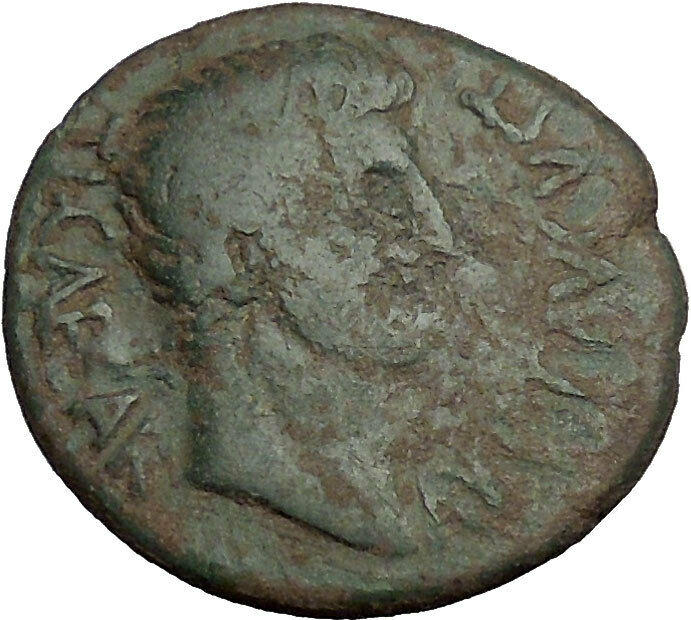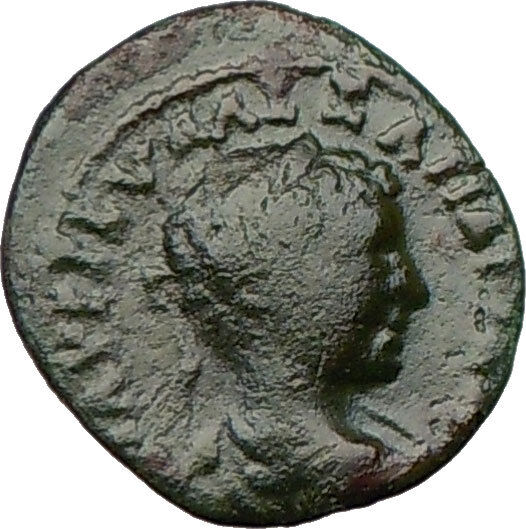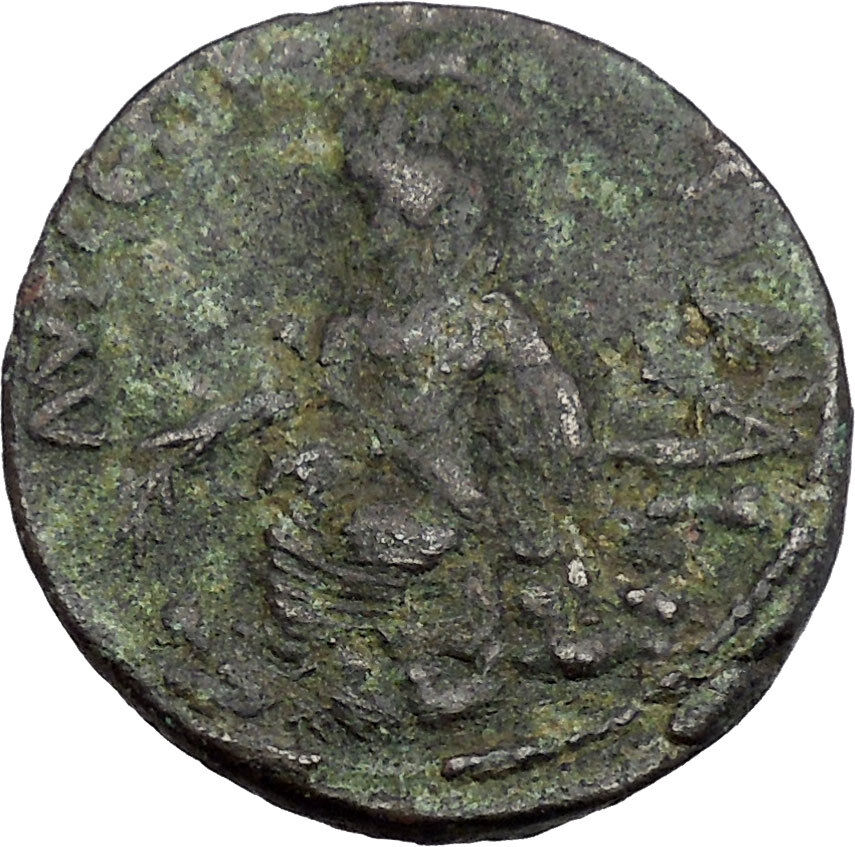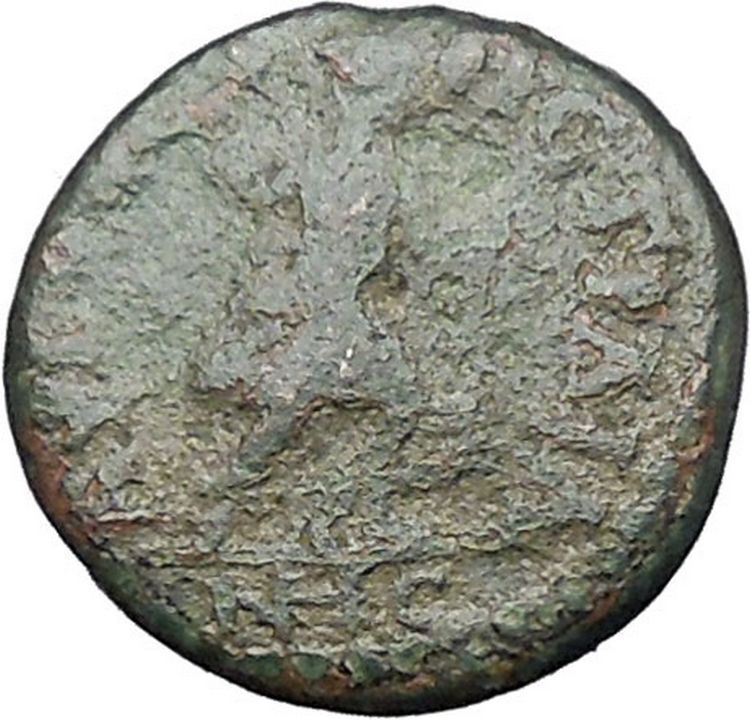|
Geta – Caesar: 198-209 A.D. and Roman Emperor: 209-211 A.D.
Bronze 16mm (2.74 grams) of Hadrianopolis mint in Thrace. Issued as Caesar circa 198-209 A.D.
Reference: Varbanov 3658
A CEΠT ΓETAC K, bare-headed, draped and cuirassed bust right.
AΔΡIANOΠOΛEITΩN, Hades seated left, holding patera in right hand and scepter in left.
You are bidding on the exact item pictured, provided with a Certificate of Authenticity and Lifetime Guarantee of Authenticity.
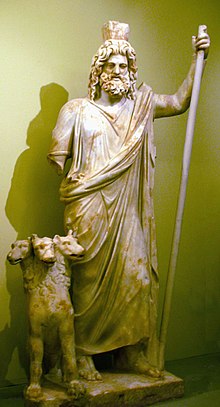 Hades was the ancient Greek chthonic god of the underworld, which eventually took his name. Hades was the ancient Greek chthonic god of the underworld, which eventually took his name.
In Greek mythology, Hades was regarded as the oldest son of Cronus and Rhea, although the last son regurgitated by his father. He and his brothers Zeus and Poseidon defeated their father’s generation of gods, the Titans, and claimed rulership over the cosmos. Hades received the underworld, Zeus the air, and Poseidon the sea, with the solid earth-long the province of Gaia-available to all three concurrently. Hades was often portrayed with his three-headed guard dog Cerberus and, in later mythological authors, associated with the Helm of Darkness and the bident.
The Etruscan god Aita and Roman gods Dis Pater and Orcus were eventually taken as equivalent to the Greek Hades and merged as Pluto, a Latinization of his euphemistic Greek name Plouton.
Edirne (ancient Hadrianopolis) is a city in Thrace, the westernmost part of Turkey, close to the borders with Greece and Bulgaria. Edirne served as the capital city of the Ottoman Empire from 1365 to 1457, when Constantinople (Istanbul) became the empire’s new capital. At present, Edirne is the capital of the Edirne Province in Turkish Thrace. The city’s estimated population in 2002 was 128,400, up from 119,298 in 2000. It has consulates of Bulgaria, Germany (Honorary), Greece, Romania (Honorary) and Slovakia (Honorary). Its sister cities are Haskovo and Yambol in Bulgaria and Alexandroupoli in Greece.
The city was founded as Hadrianopolis, named for the Roman Emperor Hadrian. This name is still used in the Modern Greek (Αδριανούπολη). The English name Adrianople, by which the city was known until the Turkish Postal Service Law of 1930, has fallen into disuse. The Turkish Edirne, the Bulgarian Одрин (Odrin), and the Serbian Једрене (Jedrene) are adapted forms of the name Hadrianopolis.

Geta – Roman Emperor: 209-211 A.D.
| Caesar: 198-209 A.D. (under Septimius Severus and Caracalla) | Augustus: 209-211 A.D. (209-211 with Septimius Severus and Caracalla) (211 A.D. with Caracalla) |
| Son of Septimius Severus and Julia Domna | Brother of Caracalla | Brother-in-law of Plautilla | Nephew of Julia Maesa | Cousin of Julia Soaemias and Julia Mamaea |
Publius Septimius Geta (March 7, 189-December 26, 211), was a Roman Emperor co-ruling with his father Septimius Severus and his older brother Caracalla from 209 to his death.
Geta was the younger son of Septimius Severus by his second wife Julia Domna. Geta was born in Rome, at a time when his father was only a provincial governor at the service of emperor Commodus.
Geta was always in a place secondary to his older brother Lucius, the heir known as Caracalla. Perhaps due to this, the relations between the two were difficult from their early years. Conflicts were constant and often required the mediation of their mother. To appease his youngest son, Septimius Severus gave Geta the title of Augustus in 209. During the campaign against the Britons of the early 3rd century, the imperial propaganda publicized a happy family that shared the responsibilities of rule. Caracalla was his father’s second in command, Julia Domna the trusted counsellor and Geta had administrative and bureaucratic duties. Truth was that the rivalry and antipathy between the brothers was far from being improved.
Joint Emperor
When Septimius Severus died in Eboracum in the beginning of 211, Caracalla and Geta were proclaimed joint emperors and returned to Rome.
Regardless, the shared throne was not a success: the brothers argued about every decision, from law to political appointments. Later sources speculate about the desire of the two of splitting the empire in two halves. By the end of the year, the situation was unbearable. Caracalla tried to murder Geta during the festival of Saturnalia without success. Later in December he arranged a meeting with his brother in his mother’s apartments, and had him murdered in her arms by centurions.
Following Geta’s assassination, Caracalla damned his memoryy and ordered his name to be removed from all inscriptions. The now sole emperor also took the opportunity to get rid of his political enemies, on the grounds of conspiracy with the deceased. Cassius Dio stated that around 20,000 persons of both sexes were killed and/or proscribed during this time.
|





 Hades was the ancient Greek chthonic god of the underworld, which eventually took his name.
Hades was the ancient Greek chthonic god of the underworld, which eventually took his name.


